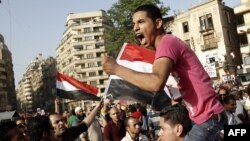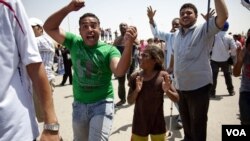CAIRO - Thousands of Egyptians have taken to the streets to protest the verdicts in the trial of former President Hosni Mubarak. The ousted leader was given a life sentence for his role in the killing of protesters during last year's uprising, but others in the case were acquitted.
Demonstrators turned out in Alexandria, Suez and other cities across the nation. In Cairo, protesters flooded Tahrir Square, the heart of the revolution, demanding everything from a retrial to the death penalty for Mubarak.
Weak evidence
The prosecutor had called for the harsher sentence, but the judge, citing weak evidence, used his discretion in handing down a life term. He found that Mubarak failed to prevent the deaths during the first week of the uprising, but was not directly responsible for them. The same verdict and sentence was given to former interior minister Habib al Adli.
Equally galling to the anti-Mubarak crowds was the acquittal of six top security officials, with some demonstrators arguing the case ended up like the revolution itself, with the leaders off the stage, but the next tier unscathed.
It was a rapid turn of mood from the jubilation outside the courthouse when the verdict was announced earlier in the day.
Family members of those killed embraced, wept, and fell to the ground in prayer.
Protester Mohammed held a picture of his brother Bilal, killed during the first days of the uprising. He said his brother went out to ask for “bread, freedom and equality” - instead, he got a bullet.
From joy to anger
But as the implications of the verdict were absorbed, and the chance it could be easily overturned became clearer, the joy turned to anger.
Some were also furious that Mubarak, his sons Gamal and Alaa, and others were acquitted of corruption charges. They suspect the vast wealth allegedly accumulated by the Mubarak family and inner circle would remain in their hands.
But some opponents of the old government felt there would, ultimately, be justice for the victims of the uprising.
Abdel Basset el Fasheni, who works with the Al Azhar Institute, said the blood of the martyrs, whether Muslim or Christian, is the responsibility of all Egyptians. "If we're not accountable in this life, we will be in front of God," he noted.
Sharp divide
El Fasheni's sentiments reflect the sharp divide many feel about the future of the country, as voters must choose who will succeed Mubarak. The second round of voting for a new president pits Islamist Mohamed Morsi against Mubarak's last prime minister, Ahmed Shafiq.
Shafiq has defended the former president, and his commander-in-chief during his long tenure in the Air Force. But as the crowds grew Saturday and other political leaders condemned the trial, Shafiq was moved to promise that, if elected, he would not pardon his former boss.
Related video report by Jeff Seldin
* Follow VOA's Elizabeth Arrott on Twitter @VOAArrott
Demonstrators turned out in Alexandria, Suez and other cities across the nation. In Cairo, protesters flooded Tahrir Square, the heart of the revolution, demanding everything from a retrial to the death penalty for Mubarak.
Weak evidence
The prosecutor had called for the harsher sentence, but the judge, citing weak evidence, used his discretion in handing down a life term. He found that Mubarak failed to prevent the deaths during the first week of the uprising, but was not directly responsible for them. The same verdict and sentence was given to former interior minister Habib al Adli.
Equally galling to the anti-Mubarak crowds was the acquittal of six top security officials, with some demonstrators arguing the case ended up like the revolution itself, with the leaders off the stage, but the next tier unscathed.
It was a rapid turn of mood from the jubilation outside the courthouse when the verdict was announced earlier in the day.
Family members of those killed embraced, wept, and fell to the ground in prayer.
Protester Mohammed held a picture of his brother Bilal, killed during the first days of the uprising. He said his brother went out to ask for “bread, freedom and equality” - instead, he got a bullet.
From joy to anger
But as the implications of the verdict were absorbed, and the chance it could be easily overturned became clearer, the joy turned to anger.
Some were also furious that Mubarak, his sons Gamal and Alaa, and others were acquitted of corruption charges. They suspect the vast wealth allegedly accumulated by the Mubarak family and inner circle would remain in their hands.
But some opponents of the old government felt there would, ultimately, be justice for the victims of the uprising.
Abdel Basset el Fasheni, who works with the Al Azhar Institute, said the blood of the martyrs, whether Muslim or Christian, is the responsibility of all Egyptians. "If we're not accountable in this life, we will be in front of God," he noted.
Sharp divide
El Fasheni's sentiments reflect the sharp divide many feel about the future of the country, as voters must choose who will succeed Mubarak. The second round of voting for a new president pits Islamist Mohamed Morsi against Mubarak's last prime minister, Ahmed Shafiq.
Shafiq has defended the former president, and his commander-in-chief during his long tenure in the Air Force. But as the crowds grew Saturday and other political leaders condemned the trial, Shafiq was moved to promise that, if elected, he would not pardon his former boss.
Related video report by Jeff Seldin
* Follow VOA's Elizabeth Arrott on Twitter @VOAArrott






